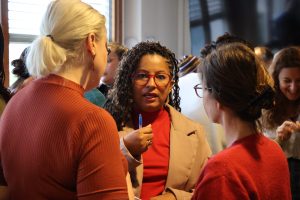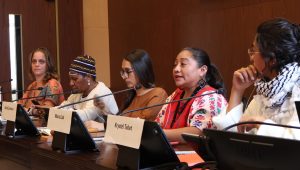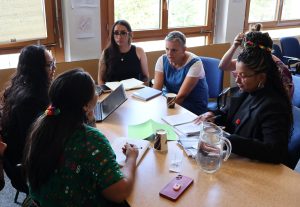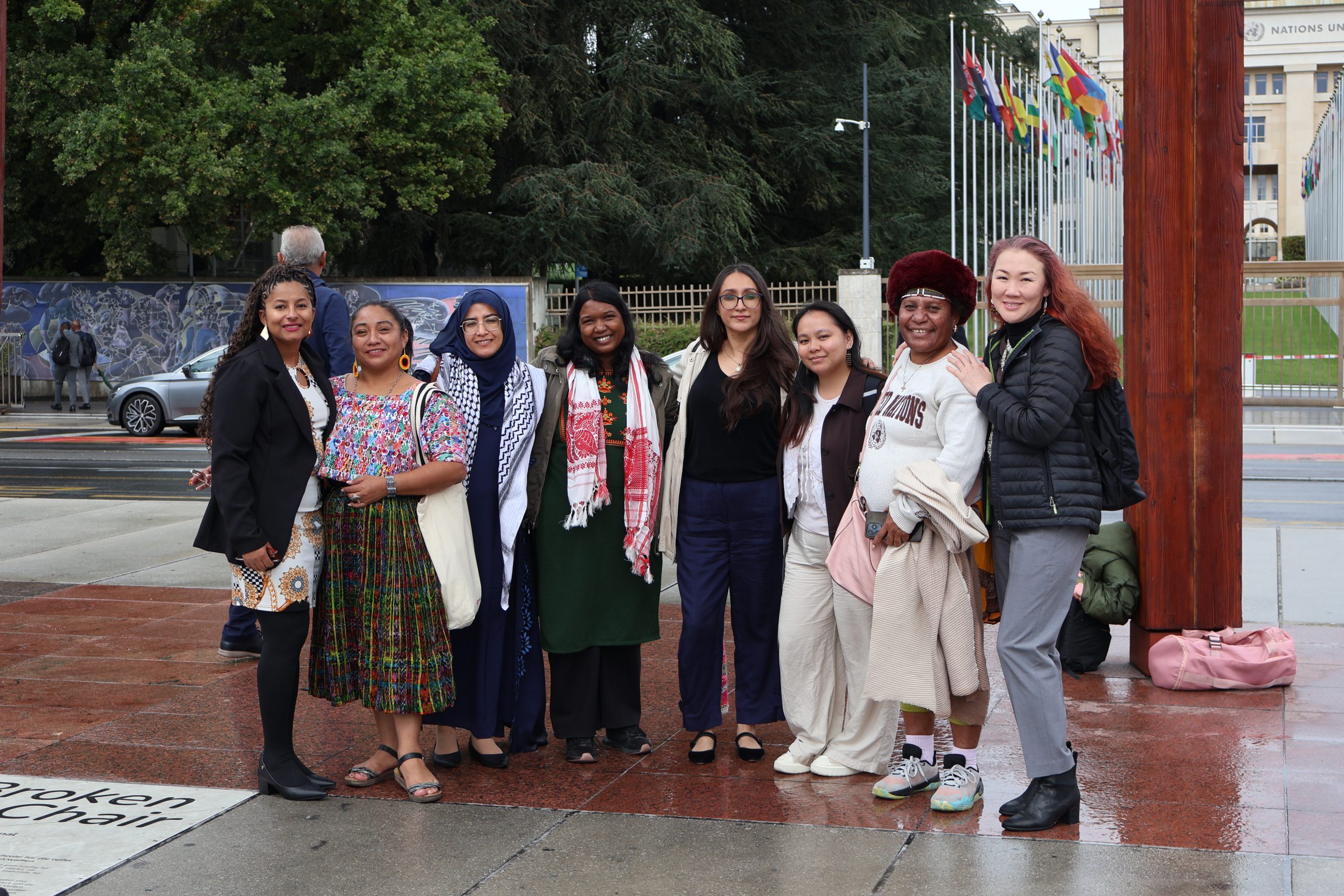The WHRD-AW 2025, co-organised by the International Service for Human Rights (ISHR), Just Associates (JASS), Peace Brigades International (PBI), Amnesty International, the WHRD MENA Coalition, IM-Defensoras, Association for Women’s Rights in Development (AWID), Front Line Defenders, Urgent Action Fund, and the Women Human Rights Defenders International Coalition (WHRD-IC), brought together 10 accomplished Indigenous leaders and women human rights defenders from Brazil, Egypt, Guatemala, India, Mexico, Palestine, Papua New Guinea, Russia, the Philippines, and Karakalpakstan. Participants engaged with diverse stakeholders to bring an intersectional perspective on Indigenous rights, land and environmental justice, gender equality, corporate accountability, and cultural rights to the UN in Geneva.
This experience enabled women defenders to strengthen their knowledge of and advocacy with the United Nations mechanisms, including Special Procedures, the Human Rights Council (HRC), and the Office of the High Commissioner for Human Rights (OHCHR). They also engaged directly with civil society organisations and the international community in Geneva.
Before travelling to Geneva, the WHRDs joined online sessions designed to provide an introduction to the international human rights infrastructure, core principles and procedures, as well as key actors of the global human rights system, preparing them for in-depth engagement during the week.
‘We are the experts on our own problems, often without realising that we hold the solutions’, said participant Cressida Kuala, from the Porgera Red Wara (River) Women’s Association. ‘The UN guidelines and mechanisms are established to guide us, the affected people in the affected communities, to have access through them, drive the process, and create the solutions for achieving justice and restoring dignity.’
The week started with a session aimed at providing participants with practical tools to understand the HRC, including its role and mandate. The session also offered guidance on how to engage with the HRC strategically, particularly from a feminist perspective. This focus was especially relevant as the activities coincided with the HRC’s 60th session.
Participants engaged in an interactive session designed to explore various advocacy techniques. The goal was to tailor their engagement with UN mechanisms to fit their specific advocacy needs, as well as those of their organisations and communities. This session also provided a chance to examine the opportunities that different international forums and stakeholders offer to human rights defenders in terms of advocacy.
Throughout the week, participants attended sessions focused on holistic physical and digital security. These sessions acknowledged the ongoing risks faced by women human rights defenders and discussed various strategies to mitigate those risks. The importance of safeguarding WHRDs was emphasised, ensuring they have sustainable strategies in place.

Photo: ISHR
Participants had the opportunity to explore the UN Special Procedures system and learn strategic methods for communicating and engaging strategically with it to maximise impact and generate change on the ground. The session provided WHRDs with direct insight into how this UN mechanism operates. Through interactive exercises and peer-led discussions, participants not only discovered ways to engage effectively but also co-created advocacy strategies for use within and beyond Geneva.
During the week, participants also led sessions to share their knowledge on crafting advocacy messages, exchanging experiences and synergies to advance their work locally.
Engaging with UN human rights mechanisms
A central element of the WHRD-AW was direct engagement with the UN system to raise awareness and influence important and diverse stakeholders. Participants attended key discussions at the HRC.
The Advocacy Week also enabled WHRDs to participate in interactive dialogues, including the sessions of the Expert Mechanism on the Rights of Indigenous Peoples (EMRIP) on Indigenous Peoples’ right to data, including data collection and disaggregation and the right of Indigenous Peoples to their traditional economies, the interactive dialogue with the Special Rapporteur on Indigenous Rights, as well as the Annual half-day panel on Indigenous Rights on Just Transition.
Cressida Kuala, from the Porgera Red Wara (River) Women’s Association, María Caal Xol, who is a representative of the Cahabón resistance in Guatemala, Aleida Alejandra Quintana Ordaz, from the National Network of WHRD in Mexico, Paula de Sousa Constante, from the Instituto Guaicuy, as well as Casselle Ton from the Cordillera Human Rights Alliance, a WHRD from Karakalpakstan and Huda Abu Obaid, a Palestinian defender, delivered oral statements about the challenges faced by their Indigenous communities, urging States and the UN system to take concrete measures.
Participants met privately with the Special Rapporteur on the Rights of Indigenous Peoples to discuss challenges, present recommendations, and insert gendered and community-rooted perspectives into international deliberations. Additionally, they met with the staff of different Special Procedures mandates to share the human rights situation of their countries, including the Special Rapporteur on the Human Right to a Healthy Environment, the Special Rapporteur on the Right to Food, the Working Group on Business & Human Rights, the Special Rapporteur on the Rights to Water & Sanitation, and the Special Rapporteur on the Right to Adequate Housing. During this exchange, WHRDs were able to share the human rights violations that their communities face. Defenders particularly shared the consequences that mining and extractive industries have in their territories, the environmental impacts on the ecosystems they protect, the lack of recognition of land titles and ownership, including the particular effects on women.
This exchange underscored the diversity of WHRD struggles—from corporate accountability and land rights to enforced disappearances and situations of occupation — while also demonstrating the interconnectedness of these challenges. These discussions provided an opportunity for defenders to connect with the mandates, creating pathways for sustained collaboration and follow-up on advocacy priorities.
By engaging in these spaces, WHRDs amplified the urgent calls of communities facing land grabs, environmental destruction, and threats to Indigenous culture.
The challenges expressed by the defenders are now part of a collective contribution to a joint submission from the Special Rapporteur on Human Rights Defenders. This contribution also includes what inspires them to keep working and how they see the UN human rights mechanisms could do better.
Building stronger networks
Throughout the week, participants engaged with a wide range of stakeholders in bilateral and multilateral meetings and events. The Advocacy Week offered structured opportunities for dialogue with Geneva-based NGOs and diplomats.

Photo: ISHR
A major highlight of the week was the side event ‘Women Human Rights Defenders: Documenting to Protect’, held on Wednesday 24 September at the Palais des Nations on the sidelines of the Human Rights Council session, co-hosted by the WHRD MENA Coalition, IM-Defensoras and ISHR. The panel included Albert K. Barume, the Special Rapporteur on the rights of Indigenous Peoples, and participants of the WHRD-AW. This side event showcased the power of documentation as a protective tool, highlighting how testimonies, data, and community-driven reporting can counter invisibility and impunity. It not only elevated the voices of Indigenous WHRDs but also reminded international actors of their responsibility to respond to documented violations with concrete action.
The defenders also engaged in direct dialogue with representatives of diplomatic missions. In an informal lunch hosted at ISHR’s office, participants shared updates on the human rights situation in their countries and practised delivering sharp, impactful advocacy messages. This exchange provided a space for defenders to build channels of communication with decision-makers who play a critical role in shaping international human rights policies.
The event ‘Women on the Frontline: Human Rights Defenders’ on 23 September at the Geneva Graduate Institute offered a valuable opportunity for WHRDs to engage directly with students. The conversation allowed students to better understand the realities and challenges faced by women defenders worldwide. The exchange encouraged solidarity and underlined the role of education and dialogue in strengthening global human rights movements.
The week was concluded by a solidarity reception, ‘Louder, angrier and stronger together’ dedicated to honouring and amplifying the voices and the struggles of WHRDs around the world. The event marked the conclusion of the WHRD Advocacy Week and the celebration of the anniversary of the WHRD International Coalition, IM-Defensoras and the WHRD Mena.
Impact: solidarity and change

Photo: ISHR
The 2025 Advocacy Week reaffirmed that Indigenous WHRDs and women defending land and communities are central to environmental and human rights discussions taking place at the UN. By providing them with tools to engage strategically with UN mechanisms, participants deepened their understanding of how UN mechanisms can support their efforts. After the advocacy week was concluded, all participants reported being either satisfied or very satisfied with the experience and felt prepared to continue engaging with the UN human rights mechanisms.
Equally important, the week fostered solidarity across regions and movements. Through shared experiences, workshops, and exchanges, defenders built networks of care and resistance, recognising that activism must also prioritise wellbeing.
For ISHR and partners, the week reaffirmed the commitment to amplify and protect the voices and well-being of WHRDs, ensuring their full and meaningful participation in global decision-making spaces. As Indigenous WHRDs continue to defend land, cultures, and futures against powerful corporate and State interests, the lessons and alliances formed in Geneva will echo well beyond the halls of the Human Rights Council.







